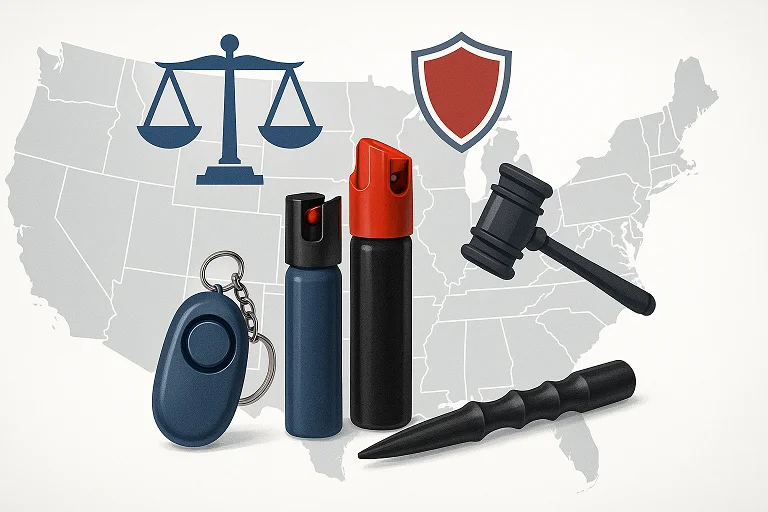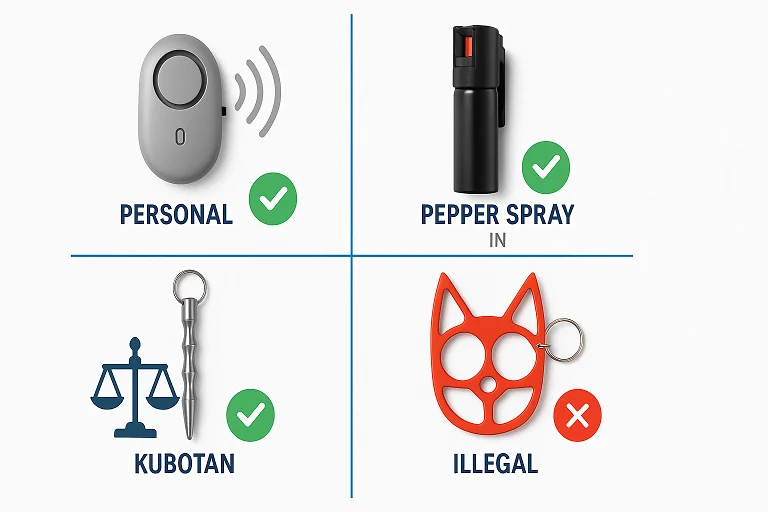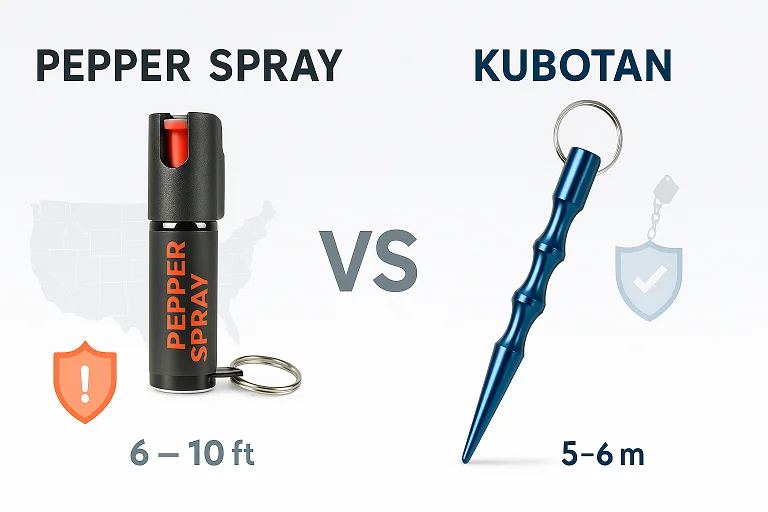Are Self-Defense Keychains Legal in All 50 States? Complete 2025 Guide
Complete guide to U.S. laws on self-defense keychains, pepper spray, personal alarms, and kubotan regulations. Know before you buy - state-by-state breakdown included.

Self-defense keychains have become increasingly popular as a convenient way to carry personal protection tools. These keychains typically include devices like pepper spray, personal alarms, kubotans, stun guns, or even small knives. However, the legality of carrying these tools varies significantly between states in the US, and understanding local laws is crucial to ensure you comply with regulations.
In this comprehensive guide, we'll provide detailed information about regulations related to self-defense keychains, focusing on pepper spray and personal alarms, across all 50 US states.
⚠️ Important Legal Disclaimer: The information in this article is for educational purposes only and does not constitute legal advice. Laws change frequently and vary by jurisdiction. Always verify current local and state regulations before purchasing or carrying any self-defense device. When in doubt, consult with local law enforcement or a legal professional.
What Do Self-Defense Keychains Include?
Self-defense keychains are designed to provide quick access to protection tools. Common items found in self-defense keychains include:

- Pepper Spray: A non-lethal spray that causes temporary blindness and discomfort to attackers
- Personal Alarms: Devices that emit loud sounds to attract attention and deter attackers
- Kubotans: Small rods or sticks used for striking or applying pressure to sensitive areas on the body
- Stun Guns: Devices that deliver electric shocks to temporarily incapacitate attackers
- Keychain Knives: Small blades for self-defense purposes
Each of these tools has different legal status depending on the state, so understanding what's permitted where you live or travel is crucial.
Component-by-Component Legal Analysis
Let's examine the legality of each common self-defense keychain component across the United States:
1. Personal Alarms (Sound Devices)
Legal Status: ✅ Legal in all 50 states without restriction
Personal alarms are legal to own and carry in all 50 states without restriction. These devices emit extremely loud sounds (typically 120-130 dB) to disorient attackers and attract attention.
Why they're universally legal:
- Considered passive deterrents, not weapons
- Don't cause physical harm, so they aren't regulated
- Can be used by people of all ages, from children to elderly
- No permit or license required anywhere
This makes personal alarms the safest and most universally accepted component of any self-defense keychain.
2. Kubotans & Tactical Pens
Legal Status: ✅ Legal in all 50 states (with some location restrictions)
A kubotan is a pointed or blunt-ended stick, typically made of metal or hard plastic, used to apply pressure to sensitive points on an assailant's body.
Legal Standing:
- Legal in all 50 states for possession and carry
- Generally viewed as everyday items like pens or keys
- Some locations like schools or government buildings may restrict them
- TSA Restriction: Must be in checked luggage for air travel
Important Considerations:
- Use must comply with self-defense laws
- Some institutions may have their own policies
- Training recommended for effective and legal use
3. Pepper Spray (OC Spray)
Legal Status: ✅ Legal in all 50 states (with varying restrictions)
Pepper spray is permitted for self-defense use in all 50 states, but some states impose restrictions on size, concentration, age, or purchase methods. Here's a comprehensive state-by-state breakdown:
Common Restrictions Include:
- Age limits: Most states require 18+ years (some allow 16+ with parental consent)
- Container size: Many states limit canister size (typically 2.5 oz or less)
- Purchase restrictions: Some require in-person purchase or special permits
- Prohibited for felons: Universal restriction across all states
- Self-defense use only: Must be intended for personal protection
State-by-State Pepper Spray Regulations:
| State | Legal Status | Additional Details |
|---|---|---|
| Alabama | Legal | No additional restrictions |
| Alaska | Legal | No sales to minors. Must be permitted and over 21 to carry in schools |
| Arizona | Legal with restrictions | Container cannot exceed 150cc |
| Arkansas | Legal with restrictions | Container cannot exceed 150cc or 5.07 oz |
| California | Legal with restrictions | No sales to minors. Container cannot exceed 2.5 oz |
| Colorado | Legal | No additional restrictions |
| Connecticut | Legal | No additional restrictions |
| Delaware | Legal with restrictions | No sales to minors without guardian permission |
| District of Columbia | Legal | Must register when purchasing |
| Florida | Legal | Container cannot exceed 2 oz |
| Georgia | Legal | No additional restrictions |
| Hawaii | Legal with restrictions | No online sales, container cannot exceed 0.5 oz |
| Idaho | Legal | No additional restrictions |
| Illinois | Legal with restrictions | No sales to minors |
| Indiana | Legal | No additional restrictions |
| Iowa | Legal | No additional restrictions |
| Kansas | Legal | No additional restrictions |
| Kentucky | Legal | No additional restrictions |
| Louisiana | Legal | No additional restrictions |
| Maine | Legal | No additional restrictions |
| Maryland | Legal | No sales to minors |
| Massachusetts | Legal with restrictions | Requires permit, only sold by licensed dealers |
| Michigan | Legal with restrictions | Only SABRE RED formula permitted |
| Minnesota | Legal | Cannot be possessed by those under 16 without guardian permission |
| Mississippi | Legal | No additional restrictions |
| Missouri | Legal | No additional restrictions |
| Montana | Legal | No additional restrictions |
| Nebraska | Legal | No additional restrictions |
| Nevada | Legal with restrictions | No sales to minors, container cannot exceed 2 oz |
| New Hampshire | Legal | No additional restrictions |
| New Jersey | Legal with restrictions | No sales to minors, container cannot exceed 0.75 oz |
| New Mexico | Legal | No additional restrictions |
| New York | Legal with restrictions | Container cannot exceed 0.75 oz, only purchase from licensed dealers |
| North Carolina | Legal with restrictions | Container cannot exceed 150cc or 5.29 oz |
| North Dakota | Legal | No additional restrictions |
| Ohio | Legal | No additional restrictions |
| Oklahoma | Legal | No additional restrictions |
| Oregon | Legal | No additional restrictions |
| Pennsylvania | Legal | No additional restrictions |
| Rhode Island | Legal with restrictions | No sales to minors |
| South Carolina | Legal with restrictions | Container cannot exceed 1.69 oz |
| South Dakota | Legal | No additional restrictions |
| Tennessee | Legal | No additional restrictions |
| Texas | Legal | No additional restrictions |
| Utah | Legal | No additional restrictions |
| Vermont | Legal | No additional restrictions |
| Virginia | Legal | No additional restrictions |
| Washington | Legal with restrictions | Age restrictions, 18+ or 14+ with parental permission |
| West Virginia | Legal | No additional restrictions |
| Wisconsin | Legal with restrictions | No sales to minors, container cannot exceed 2 oz, specific component and safety feature requirements |
| Wyoming | Legal | No additional restrictions |
Note: Laws may change. Always check with local authorities for the most current regulations.
4. Stun Guns (Electroshock Weapons)
Legal Status: ✅ Legal in 49 states (Prohibited in Rhode Island and Michigan)
Stun guns have varying regulations between states. They are legal in 49 states, except Rhode Island where they are banned, and Michigan where they're prohibited. Here's a comprehensive breakdown:
State-by-State Stun Gun Regulations:
| State | Legal Status | Restrictions/Conditions |
|---|---|---|
| Alabama | Legal | City permit required in Mobile, prohibited in schools |
| Arizona | Legal | Must be 18+, no permit required |
| Arkansas | Legal | Must be 19+ |
| California | Legal | Not for felons, drug addicts, or under 18 without parental consent |
| Colorado | Legal | No permit required |
| Connecticut | Legal | Requires gun permit, must be 21+ |
| Delaware | Legal | Must be 21+, background check, banned in Newark, Wilmington, New Castle County |
| Florida | Legal | Prohibited for felons, under 16 without parental supervision |
| Georgia | Legal | Prohibited for felons |
| Hawaii | Legal | Must be 21+, background check, permit required, no online purchases |
| Idaho | Legal | Restrictions for felons |
| Illinois | Legal | Requires FOID card or concealed carry permit, banned in Chicago, public housing, schools, courts |
| Indiana | Legal | Requires permit and valid ID |
| Iowa | Legal | Banned in Denison and Crawford County |
| Kansas | Legal | Must be 18+, no permit required |
| Kentucky | Legal | No special permit required |
| Louisiana | Legal | No special permit required |
| Maine | Legal | Must be 18+, no criminal record |
| Maryland | Legal | Background check, no permit required |
| Massachusetts | Legal | Permit required |
| Michigan | ILLEGAL | Prohibited statewide |
| Minnesota | Legal | Must be 18+, background check, no criminal record |
| Mississippi | Legal | No statewide restrictions |
| Missouri | Legal | No special permit required |
| Montana | Legal | No permit required |
| Nebraska | Legal | Must be 18+, no criminal record |
| Nevada | Legal | Must be 18+, no criminal record, no permit required |
| New Hampshire | Legal | Must be 18+, no permit required |
| New Jersey | Legal | Must be 18+, no permit required |
| New Mexico | Legal | No statewide restrictions |
| New York | Legal | Must be 18+, no criminal record, no permit required |
| North Carolina | Legal | No permit required |
| North Dakota | Legal | No permit required |
| Ohio | Legal | Permit required |
| Oklahoma | Legal | Permit required |
| Oregon | Legal | No permit required, specific laws in Portland |
| Pennsylvania | Legal | Must be 18+, no special permit required |
| Rhode Island | ILLEGAL | Prohibited statewide |
| South Carolina | Legal | No permit required |
| South Dakota | Legal | No permit required |
| Tennessee | Legal | No special permit required |
| Texas | Legal | No statewide restrictions |
| Utah | Legal | No permit required |
| Vermont | Legal | No permit required |
| Virginia | Legal | No permit required |
| Washington | Legal | Banned in Ruston |
| West Virginia | Legal | No special permit required |
| Wisconsin | Legal | Permit required, must be in closed container |
| Wyoming | Legal | No permit required |
| U.S. Virgin Islands | ILLEGAL | Prohibited |
Source: Blingsting - Laws may change, always check with local authorities for current regulations.
5. Other Tools
Self-defense keychains may include other tools like small knives. However, knife laws are very complex and vary between states and cities. Some states have limitations on blade length or knife types. Users need to carefully check local laws regarding these additional tools.
Knife Considerations:
- Blade length restrictions: Many jurisdictions limit allowable blade lengths
- Concealed carry laws: Some areas prohibit concealed knife carry
- School and government building restrictions: Often prohibited in sensitive locations
- Local ordinances: City and county laws may be more restrictive than state laws
TSA & Air Travel Guidelines
Planning to travel? Here's what the Transportation Security Administration allows:
| Item | Carry-On | Checked Luggage |
|---|---|---|
| Personal Alarms | ✅ Allowed | ✅ Allowed |
| Kubotans/Tactical Pens | ❌ Prohibited | ✅ Allowed |
| Pepper Spray | ❌ Prohibited | ✅ Limited (4 oz max with safety mechanism) |
| Stun Guns | ❌ Prohibited | ✅ Allowed (if legal in destination) |
| Knives | ❌ Prohibited | ✅ Allowed (if legal in destination) |
Travel Tips:
- Even if an item is legal in your state, check the laws of your destination state before traveling
- Always declare items in checked luggage when required
- Remove batteries from electronic devices when packing in checked luggage
Choosing the Right Self-Defense Keychain
When selecting a self-defense keychain, consider the following factors:
Legal Compliance
- Ensure all components are legal in your state
- Check both state and local municipal laws
- Verify laws for travel destinations
- Consider workplace policies and restrictions
Usability Factors
- Ease of use: Choose tools you feel comfortable using and can access quickly
- Training requirement: Be familiar with how to use each tool effectively
- Size and weight: Select discrete options that are easy to carry
- Reliability: Choose quality products from reputable manufacturers
Best Practices
- Know your local self-defense laws: When force is legally justified varies by state
- Proper storage: Keep items secure and readily accessible for legitimate use
- Avoid prohibited areas: Schools, government buildings, private property restrictions
- Regular training: Practice with your tools to ensure effectiveness when needed
Recommended Legal Components
Based on our legal research, the safest combination includes:
✅ Personal alarm (130 dB) - Legal everywhere
✅ Small pepper spray (2 oz or less) - Legal with minor state restrictions
✅ Kubotan or tactical pen - Legal in all states
✅ LED flashlight - No restrictions anywhere
✅ Emergency whistle - Universally legal
❌ Avoid in most states: Stun guns (check state laws), knives (complex regulations)
Important Reminders
Remember that the best self-defense tool is one you can legally carry, properly use, and access quickly when needed. Here are key points to keep in mind:
Legal Considerations
- Always verify local laws before purchasing or carrying any self-defense device
- Check destination laws when traveling between states
- Understand that laws change - stay informed about updates in your area
- Consider liability - improper use can result in legal consequences
Practical Usage
- Training is essential - familiarize yourself with each component
- Regular maintenance - ensure devices work when needed
- Situational awareness - tools are supplements to, not replacements for, awareness
- Know when to use - understand self-defense laws in your jurisdiction
Travel Considerations
- TSA regulations apply for air travel
- State-to-state variations may affect what you can carry
- International travel may have different restrictions entirely
Conclusion
Self-defense keychains are valuable tools for personal safety, but understanding the legal regulations is crucial. Personal alarms are legal in all states, while pepper spray and stun guns have varying restrictions depending on the state. Other tools like kubotans are generally legal, but knives and similar items may be heavily restricted.
Key Takeaways:
- Personal alarms - Your safest choice, legal everywhere
- Pepper spray - Legal nationwide with state-specific size and age restrictions
- Stun guns - Legal in 49 states (prohibited in Rhode Island and Michigan)
- Kubotans - Generally legal but check institutional policies
- Always verify local laws - especially when traveling
Always check local laws and use these tools responsibly, only in legitimate self-defense situations. Misuse can lead to legal consequences regardless of the tool's legal status.
Sources:
- World Population Review - Pepper Spray Laws by State
- Blingsting - Stun Gun Laws by State
- Various State Legal Codes and Municipal Ordinances
- Transportation Security Administration (TSA) Guidelines
Last updated: January 2025. Laws are subject to change - always verify current regulations with local authorities.
